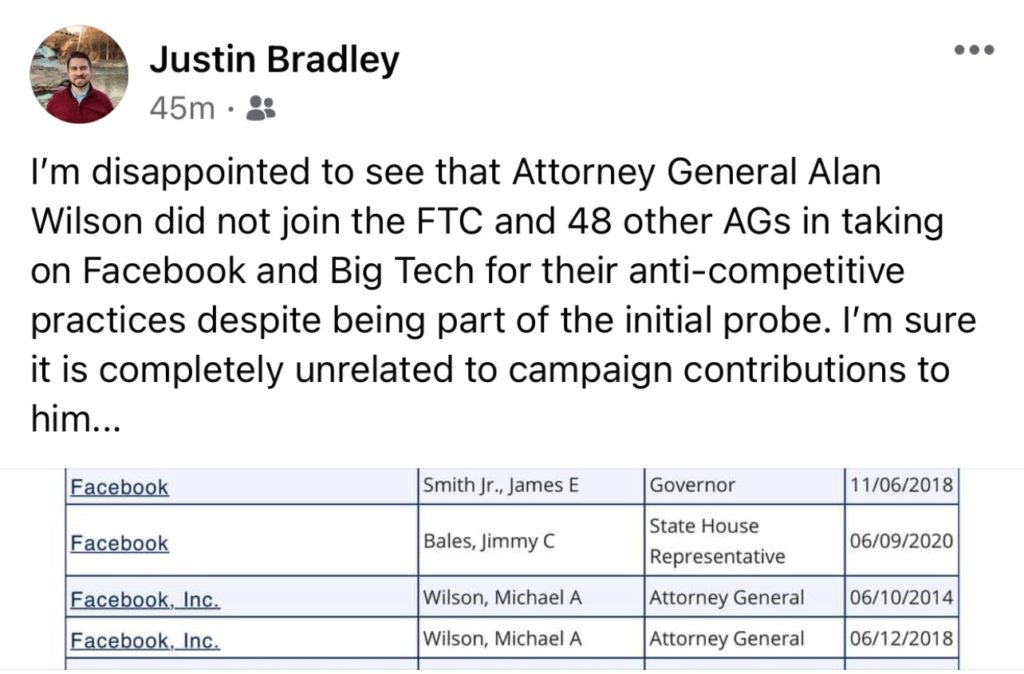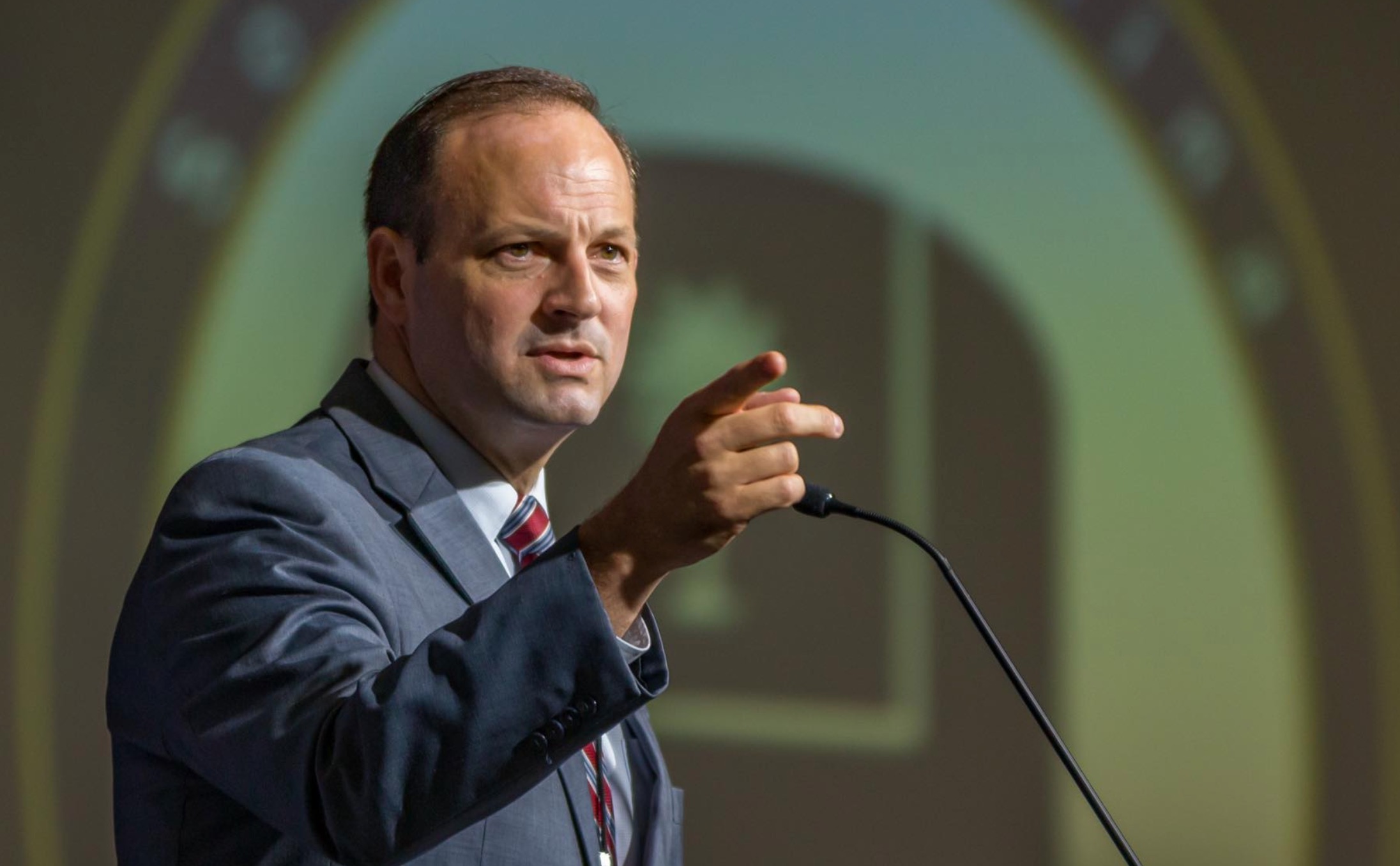South Carolina attorney general Alan Wilson is facing criticism over contributions received from social media giant Facebook – money that one of his critics claimed played a role in Wilson’s decision not to join an antitrust case against the company.
Justin Bradley – a Greenville, S.C. attorney who formerly served as a county councilman in Spartanburg county – wrote earlier this month (on his Facebook page, ironically) that he was “disappointed” Wilson did not join the Federal Trade Commission (FTC) and 48 other attorneys general “in taking on Facebook and Big Tech for their anti-competitive practices.”
“I’m sure it is completely unrelated to campaign contributions to him,” Bradley noted sarcastically, posting a screen cap which would appear to indicate Wilson took money from Facebook as recently as June of 2018.
(Click to view)

(Via: Facebook)
First, though, the lawsuit (.pdf) …
The FTC and dozens of attorneys general across the country have accused the social media giant of “illegally maintaining its personal social networking monopoly through a years-long course of anticompetitive conduct.”
Earlier this month, federal officials and attorneys general (led by Letitia James of New York) filed the suit – which alleged that Facebook has been abusing its market position to acquire rivals including Instagram and WhatsApp.
Ironically, the FTC approved both of these acquisitions … but now it wants to roll them back. Specifically, the antitrust lawsuit seeks the “divestiture or reconstruction of businesses … including, but not limited to, Instagram and/ or WhatsApp.”
“Facebook’s actions to entrench and maintain its monopoly deny consumers the benefits of competition,” FTC Bureau of Competition director Ian Connor said in a statement announcing the suit. “Our aim is to roll back Facebook’s anti-competitive conduct and restore competition so that innovation and free competition can thrive.”
For its part, Facebook has blasted the suit as “revisionist history.”
“Regulators correctly allowed these deals to move forward because they did not threaten competition,” the company’s vice president and general counsel Jennifer Newstead wrote in a blog post. “Now, many years later, with seemingly no regard for settled law or the consequences to innovation and investment, the agency is saying it got it wrong and wants a do-over.”
As for the allegation against Wilson, a review of records from the S.C. State Ethics Commission (SCSEC) reveals he indeed took a total of $7,000 in campaign contributions from Facebook between July 11, 2012 and December 7, 2015.
Wilson has taken no money from the social media giant in his current election cycle, however.
Why did Bradley’s screen cap show contributions from 2018? Because it pulled records from the election cycle in which the contributions were made, and the 2015 contributions from Facebook to Wilson came after his 2014 election victory.
First elected in 2010, Wilson has won two additional four-year terms as attorney general – in 2014 and 2018. As we have noted in several recent stories, he is among the GOP politicians often mentioned as a possible candidate for governor in 2022.
According to Wilson’s office, the decision not to sign onto the lawsuit (initially, anyway) was made at the staff level – not by the attorney general.
“At the time the Facebook complaint was filed, career staff in our consumer protection and antitrust division were not ready to make a recommendation to sign on because they had not been able to determine how much it would cost the state in money and personnel,” attorney general spokesman Robert Kittle told us. “There were concerns we’d be exceeding our financial bandwidth.”
Still, Kittle indicated the review was ongoing – and that Wilson could still join the lawsuit at a later date.
“We’re still reviewing it and it’s possible we could join in the future,” he said. “We’re already actively litigating several major cases with large budgets, including against generic drug manufacturers and Google.”
Meanwhile, Wilson’s political strategist Mark Knoop rebuked the suggestion that campaign contributions could have played a role in the decision-making process within the attorney general’s office, citing a list of Wilson contributors who have found themselves on the receiving end of litigation from his office.
Among them? Former S.C. House speaker Bobby Harrell, Pfizer, Purdue Pharma and SCANA, the former utility company that along with government-run Santee Cooper plunged the Palmetto State into a $10 billion (and counting) command economic disaster.
-FITSNews
***
WANNA SOUND OFF?
Got something you’d like to say in response to one of our articles? Or an issue you’d like to address proactively? We have an open microphone policy! Submit your letter to the editor (or guest column) via email HERE. Got a tip for a story? CLICK HERE. Got a technical question or a glitch to report? CLICK HERE.

